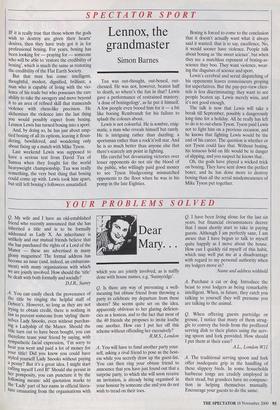SPECTATOR SPORT
Lennox, the grandmaster
Simon Barnes
IF it is really true that those whom the gods wish to destroy are given their hearts' desires, then they have truly got it in for professional boxing. For years, boxing has been looking for — praying for — someone who will be able to 'restore the credibility of boxing', which is much the same as restoring the credibility of the Flat Earth Society.
But that man has come: intelligent, thoughtful, modest, dignified, brilliant; a man who is capable of living with the vio- lence of his trade but who possesses the rare ability to take the savagery and move beyond it to an area of refined skill that transcends violence with chess-like precision. He alchemises the violence into the last thing you would possibly expect from boxing. Lennox Lewis has turned boxing into a sport.
And, by doing so, he has just about emp- tied boxing of all its options, leaving it floun- dering, bewildered, and wondering only about fixing up a match with Mike Tyson.
Last weekend Lewis was supposed to have a serious test from David Tua of Samoa when they fought for the world heavyweight championship. Tua was really something, the very best thing that boxing could come up with. Lewis took him apart, but still left boxing's followers unsatisfied. Tua was out-thought, out-boxed, out- chessed. He was not, however, beaten half to death, so where's the fun in that? Lewis gave a performance of restrained mastery, `a dose of boxingology', as he put it himself. A few people even booed him for it — a bit like booing Rembrandt for his failure to splash the colours about.
Lewis is not colourful. He is sombre, enig- matic, a man who reveals himself but rarely. He is intriguing rather than dazzling; a sportsman rather than a rock'n'roll star. And he is so much better than anyone else that there's scarcely any point in fighting.
His careful but devastating victories over lesser opponents do not stir the blood of the public, who willingly paid good money to see Tyson bludgeoning mismatched opponents to the floor when he was in his pomp in the late Eighties. Boxing is forced to come to the conclusion that it doesn't actually want what it always said it wanted; that is to say, excellence. No, it would sooner have violence. People talk about boxing as 'the sweet science', but when they see a matchless exponent of boxing-as- science they boo. They want violence, wear- ing the disguises of science and sport.
Lewis's cerebral and serial dispatching of his opponents leaves connoisseurs groping for superlatives. But the pay-per-view clien- tele is less discriminating: they want to see people beaten up. Lewis merely wins, and it's not good enough.
The talk is now that Lewis will take a break till September, possibly a dangerously long time for a holiday. All he really has left to do is to out-chess Tyson. Tyson paid Lewis not to fight him on a previous occasion, and he knows that fighting Lewis would be the end of his career. The question is whether or not Tyson could face that. Without boxing, his tenuous hold on life would be in danger of slipping, and you suspect he knows that .
Oh, the gods have played a wicked trick on boxing. They have sent down the perfect boxer, and he has done more to destroy boxing than all the serial misdemeanours of Mike Tyson put together.


































































































 Previous page
Previous page